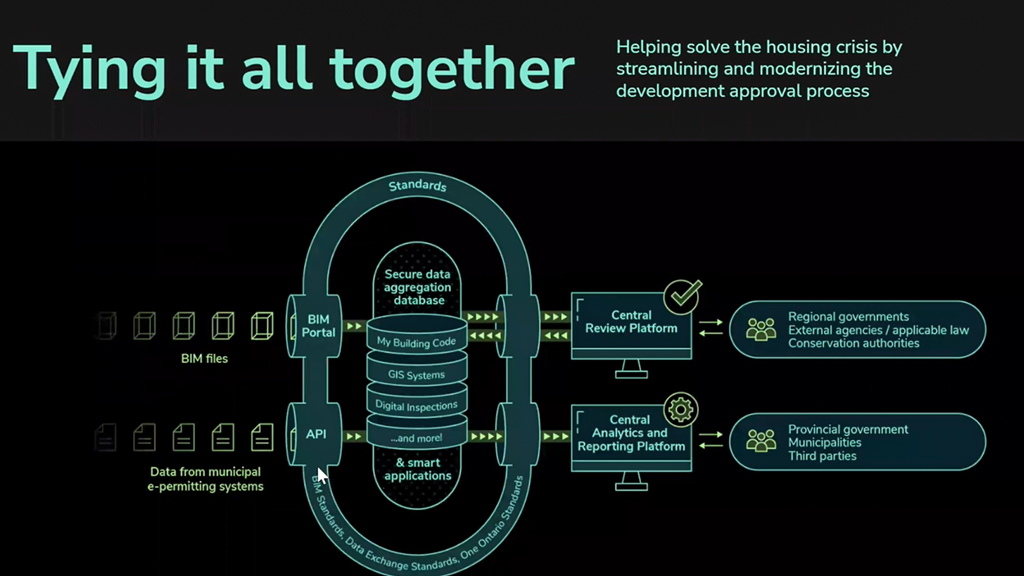What is it going to take for the Ontario government to come to the table when it comes to the housing crisis? How can stakeholders emphasize the urgency?
These were some of the questions Arash Shahi, co-founder and CEO of AECO Innovation Lab, posed during a recent online conference entitled Leaping ahead or falling behind: How One Ontario can help solve the Housing Crisis.
The One Ontario Coalition, led by AECO Innovation Lab, has put forward a proposal to streamline and modernize the development approvals process and is urging the government to get on board.
“There is one thing we all agree on and that is as a province we need to move forward. We need to digitize. We need to streamline. We need to be able to communicate more effectively as far as development approvals are concerned,” said Shahi.
The One Ontario initiative proposes to establish data exchange guidelines for the development approvals process that will result in a more efficient process; easier and more cost-effective exchange of data; and will also encourage technological innovation within the building and development industry.
According to Shahi, members of the coalition represent the province’s building officials, planners, residential and ICI developers, technology providers and regulatory agencies. But one big piece of the puzzle is missing.
One Ontario submitted a proposal to the Ontario government to join the table and work to create open data standards that everyone can use and benefit from. With every other jurisdiction that has been able to address this issue, there has been top-down support from their governments, said Shahi.
“We’ve submitted a proposal to the ministry. We’re going to be submitting a letter to Premier (Doug) Ford and to different ministries asking them to act now because we are losing valuable time,” said Shahi.
“It’s a little frustrating for us to have a proposal at a particular ministry or government and have six and seven and eight months of back and forth without a decision being made,” said Shahi, adding the private sector is making strides in adopting new technology but it’s not aligned with regulatory requirements set by the province. “The investments that we are making in the private sector, if we can’t push that up to the government it just hinders the industry moving forward with new innovation and technology.”
Brooks Barnett, director of government relations and policy with REALPAC, pointed out when you look at the extensive list of members of the coalition, the Ontario government is missing.
“The way it ought to be done is to champion this initiative by linking it back to the government’s own objectives: bringing housing online faster and the equity that will be provided in doing so for regular people. That is one way we do it,” said Barnett.
“The second way we do it is by tying the grossly inefficient process to a waste of money on the government’s side and justifying how digitalization can improve the efficiencies of this government.”
To name a few hurdles in the development approvals process, speakers pointed to the fact Canada currently ranks 64 out of 190 countries in the world on development approval efficiency for routine building projects. They also said there are up to 45 agencies to go through in order to get a housing project approved in Ontario.
Paul De Berardis, director of building science and innovation at the Residential Construction Council of Ontario, said the development approvals process is slow, lags behind other jurisdictions and needs to be digitalized.
“Although builders and developers are trying to get as much as they can through the approvals process it is very slow. As that demand ramps up the industry cannot respond to that demand in any type of elastic fashion as there is that five-to-10-year lag between when the development application first goes in and you actually start seeing permit applications and permit issuances happening,” he explained. “All the research that’s happened in other jurisdictions around the world has shown that we really do have to tackle that supply side, so breaking down barriers between provincial, regional and municipal governments and bringing the process to a digital platform is really the only way forward that we see.”
Aubrey LeBlanc, CAO at the Ontario Building Officials Association, said the association signed on to the initiative because they are part of the problem but want to be part of the solution. In general he said Canadians move at a slower pace in adapting new technology and approaches.
“We know that we are down to the last two months probably of our runway because, as of the new year in Ontario, government will quiet down quite a bit and not start new files,” said LeBlanc. “We’ve got to do something to crack the decision-making path here at a time when it’s now even more difficult to do to be blunt because…we’ve got a bottleneck of public policy stuff happening at the government level and the wind down has started, so that’s the reality.”
Follow the author on Twitter @DCN_Angela.











Recent Comments